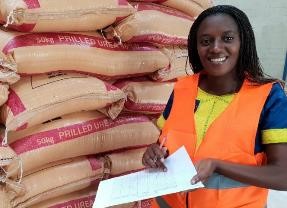Support for Agrodealers Improves Business and Access to Farm Inputs
Agrodealers are an essential part of the agricultural value chain system, but their businesses can be lucrative or daunting depending on which side of the coin you flip. Pacifique Uwayisaba, a mother of two, has experienced the downside of this. She has been an agrodealer in Ngororero district for the last nine years since 2009, and her business first registered growth but later slowed down, making losses due to low profits and delays in the delivery of goods.
“I had to close 20 out of my 25 outlets to cut on losses and stay afloat. I used to stock 2,500 tons per year; now, this has shrunk to 700 tons,” she said. Her woes resulted from operating in a disorganized business environment with no clear guidelines to follow.
The introduction of distribution agencies like Agro Processing Trust Corporation also meant that the $0.11 (100 RWF) per kg that agrodealers gained had to be reduced to $0.03 (30 RWF). The arrangement also had other side effects. Agrodealers in a particular locality were required to wait for others to place their orders, making some run out of stock and fail to deliver on time what smallholder farmers wanted to buy in time for a particular season.
“My clients would find me when I have run out of stock while waiting for other agrodealers to make their order to have a single delivery. This was hurting my business, and I lost many clients to my rivals,” Uwayisaba said.
Not out of options, Uwayisaba joined agrodealers being organized by the Feed the Future Rwanda Hinga Weze activity in the ten districts of Gatsibo, Bugesera, Rutsiro, Nyabihu, Karongi, Nyamasheke, Nyamagabe, Kayonza, Ngoma, and Ngororero. With funding from USAID and Feed the Future, Hinga Weze is mobilizing agrodealers to provide affordable and easily accessible inputs as one of the mechanisms to sustainably increase smallholder farmers’ income and the resilience of Rwanda’s agricultural and food systems.
The first step for Hinga Weze was to arrange for agrodealers to get certified. Uwayisaba had been made aware of the 2012 Organic Law governing agrochemicals and the Ministerial Order of 2016 regulating agrochemicals and is now sensitizing others. So far, Hinga Weze has assisted 212 agrodealers in complying with the agrochemical law out of 240 agrodealers operating in ten districts. Uwayisaba is among the seven agrodealers who were already certificated in April 2018 by the regulating body, Rwanda Agriculture Livestock Inspection, and Certification Services.
To improve profit margins, Hinga Weze assessed the fertilizer subsidies and pricing impact that agrodealers incurred in their businesses. Lobbying on their behalf, profits on agroinputs have been revised, increasing the profit margin by $0.01 (10 RWF) per kg from $0.03 (30 RW) to $0.04 (40 RWF). This includes $0.02 (2 RWF) for the farmer promoter.
“I felt empowered when I was given the certificate, and this new profit margin means I can increase my annual stock up to 1,000 tons,” said Uwayisaba.
Hinga Weze is mobilizing agrodealers to form cooperatives, building on 30 already registered countrywide. As head of agrodealers in Ngororero, Uwayisaba is borrowing a leaf from Nyamagabe Agro-Dealers’ Cooperative, which has distribution rights around the district. Her group is now requesting to have the same distribution rights, thereby increasing the profit margin by $0.03 (3 RWF) per kg allocated as a distribution fee. The sky is the limit for this enterprising woman.



